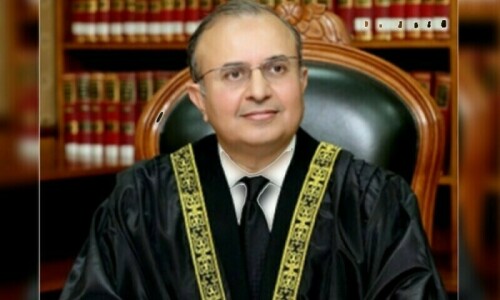KARACHI: The fact that electronic media need to learn a great deal in terms of journalistic ethics was reinforced on Wednesday evening during a condolence reference for the distinguished political activist Mairaj Mohammad Khan at the Karachi Press Club.
As soon as Federal Minister for Information, Broadcasting and National Heritage Senator Pervaiz Rashid finished his speech and left the venue, a majority of cameramen representing different TV channels switched off their cameras and took away their microphones placed on the podium rather hastily where another speaker Hassamul Haque had begun delivering his address. They did not care for the speaker and grabbed microphones.
Earlier, Senator Pervaiz Rashid commenced his speech by apologising for arriving late to the event, citing weather conditions and the traffic situation as his reasons. He said Khan sahib (Mairaj Mohammad Khan, who died on July 21) represented an era which according to Faiz was shab gazeedah (night-bitten) and in Jalib’s words ahd-i-sitam (tyrannical times). He said he was a political worker who had the most powerful voice in favour of democracy. He said if on the one hand his personality had rage (lalkaar), on the other hand it was soft and cultured.
In that context, Senator Rashid recounted two stories. He said in 1970 a special military court put him into jail. When he was released from prison, Bhutto sahib had come to power. Bhutto sahib, he said, made Khan sahib a minister. As the minister, while he was going to Peshawar a policeman was ‘piloting’ his car. He said he (Rashid) asked Khan sahib if he knew who the policeman was. He said he didn’t know. He told him that the policeman (who later became a DIG) was from the special branch and was one who wrote a report against him because of which he landed into jail. Upon knowing that Khan sahib said it was fated (haathon ki lakeeron mein hai) that policemen would either be behind or in front of him. He said he then said to him (Rashid) that he shouldn’t mention it to the policeman.
Senator Rashid’s second story was about his own house where Khan sahib had once stayed. He said he was out for work one day and when he returned his wife told him that Khan sahib had got things (groceries) for the kitchen. When he inquired Khan sahib about it, he said he gave the list to the (special branch) man outside the house asking him to bring all the stuff and mention all the stuff in his (secret) report as well.
Senator Rashid said Khan sahib was our asset and though he was not among us anymore, his ideals and principles were with us. He said if we had heard what he was saying in the 1970s, we wouldn’t have had to launch the Zarb-i-Azb and Pakistan would have been a beautiful country.
The minister said Khan sahib believed in having dialogue (woh mukalamey ke aadmi thay). He said he looked for a society where questions could be raised. He said he wanted civilian supremacy be accepted in Pakistan. He said a large period of his struggle was the struggle against martial law.
Senator Rashid said Khan sahib both admired and criticised Mr Bhutto. He said Mr Bhutto used to say that he kept him in jail because he did not want him to get an audience (majma). But, he said, today’s Pakistan had become Mairaj’s audience.
Former chief minister of Balochistan Dr Abdul Maalik said he knew Mairaj Mohammad Khan from the time he was in the Hyderabad jail. He said his BSO leaders used to tell him about Mairaj sahib’s struggle and progressive thinking. He said his struggle against dictatorship in the 1960s was revolutionary. He said he was the best orator. He wished that today we had a great many people like him.
Dr Maalik said we had dispersed (bikhar gaey hain), especially those political forces that belonged to the left. He requested everyone to revisit things a little because they weren’t that difficult to revisit. He said unfortunately the seniors and the younger lot present at the venue had either become indifferent to the situation or had distanced themselves from us. He said in order to get real democracy and parliamentary system we needed to bring the dispersed people onto one platform. He said we could pay tribute to Mairaj Mohammad Khan by taking his ideas forward.
Artiste Sheema Kermani made an announcement. She said we’d been witnessing bloodshed in our city for a long time and enough was enough. To protest against it, she said, a campaign was being launched to gather people together (artists, writers, poets, performers, students, political workers etc) where they would hold one another’s hand on Aug 6, at 4pm the Karachi Press Club.
Journalist Ahfazur Rehman’s tribute to Mairaj Mohammad Khan was read out by Momin Khan Momin. It started with a nice little poem. In his paper he said Mairaj sahib was no more, but the dignified manner (shaan) with which he fought against dictatorial forces was there.
Columnist Muqtada Mansoor said Mairaj sahib belonged to that generation of political workers that wanted the people to get their rights. He said he was a remarkable political activist and a political administrator (siasi muntazim). He said he openly challenged dictatorship from the platform of the National Students Federation (NSF). He said if we were to understand him, it was important to understand the NSF.
Former emir of the Jamaat-i-Islami Munawwar Hassan said in the past students having different ideologies at Karachi University used to fight fiercely, but in the evening they would share a cup of tea. He said if society needed more than one ideological movements (agar nazriati tehreekon ki zaroorat hai) then society should have them.
There was a long list of speakers that included Umar Baloch, Manzoor Razi, Abdul Khaliq Junejo, Mujahid Barelvi, Anis Baqar, Rashid Rabbani, Ahmed Shah, Hassamul Haq, Beena Sarwar and Zahida Hina.
Published in Dawn, August 4th, 2016














































